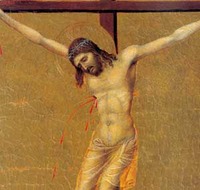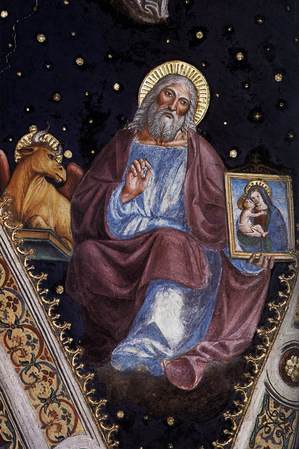The US Bishops issued a statement today explaining the need for us to form our conscience according the teaching of the Church. Our morality is not merely a set of rules but an adherence to a person, Jesus Christ. We are called to follow the witness of the bishops and in doing so we follow Jesus. Read the teaching here.
From Hollywood to cloister, Dolores Hart connects spirituality and acting
When Rev. Mother Dolores Hart walked away from her life as an actress in Hollywood to become a nun in Connecticut, she thought she had put acting behind her.
Continue reading From Hollywood to cloister, Dolores Hart connects spirituality and acting
Beholding God’s Word, Touching God’s Word
The Ecumenical Patriarch spoke not just of words imprinted on the hearts and minds of the holy ones, but also of the gift of the fire of God’s Word that must be alive and burning within the hearts of the saints. (Father Thomas Rosica, CSB)
Your Holiness,
Synodal Fathers,
It is at once humbling and inspiring to be graciously invited by Your Holiness to address the XII Ordinary General Assembly of this auspicious Synod of Bishops, an historical meeting of Bishops of the Roman Catholic Church from throughout the world, gathered in one place to meditate on “the Word of God” and deliberate on the experience and expression of this Word “in the Life and Mission of the Church.”
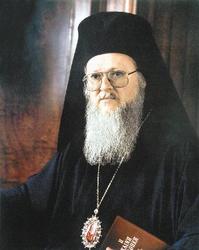 This gracious invitation of Your Holiness to our Modesty is a gesture full of meaning and significance — we dare say an historic event in itself. For it is the first time in history that an Ecumenical Patriarch is offered the opportunity to address a Synod of the Bishops of the Roman Catholic Church, and thus be part of the life of this sister Church at such a high level. We regard this as a manifestation of the work of the Holy Spirit leading our Churches to a closer and deeper relationship with each other, an important step towards the restoration of our full communion.
This gracious invitation of Your Holiness to our Modesty is a gesture full of meaning and significance — we dare say an historic event in itself. For it is the first time in history that an Ecumenical Patriarch is offered the opportunity to address a Synod of the Bishops of the Roman Catholic Church, and thus be part of the life of this sister Church at such a high level. We regard this as a manifestation of the work of the Holy Spirit leading our Churches to a closer and deeper relationship with each other, an important step towards the restoration of our full communion.
It is well known that the Orthodox Church attaches to the Synodical system fundamental ecclesiogical importance. Together with primacy synodality constitutes the backbone of the Church’s government and organisation. As our Joint International Commission on the Theological Dialogue between our Churches expressed it in the Ravenna document, this interdependence between synodality and primacy runs through all the levels of the Church’s life: local, regional and universal. Therefore, in having today the privilege to address Your Synod our hopes are raised that the day will come when our two Churches will fully converge on the role of primacy and synodality in the Church’s life, to which our common Theological Commission is devoting its study at the present time.
The theme to which this episcopal synod devotes its work is of crucial significance not
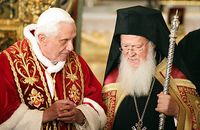 only for the Roman Catholic Church but also for all those who are called to witness to Christ in our time. Mission and evangelization remain a permanent duty of the Church at all times and places; indeed they form part of the Church’s nature, since she is called “Apostolic” both in the sense of her faithfulness to the original teaching of the Apostles and in that of proclaiming the Word of God in every cultural context every time. The Church needs, therefore, to rediscover the Word of God in every generation and make it head with a renewed vigour and persuation also in our contemporary world, which deep in its heart thirsts for God’s message of peace, hope and charity.
only for the Roman Catholic Church but also for all those who are called to witness to Christ in our time. Mission and evangelization remain a permanent duty of the Church at all times and places; indeed they form part of the Church’s nature, since she is called “Apostolic” both in the sense of her faithfulness to the original teaching of the Apostles and in that of proclaiming the Word of God in every cultural context every time. The Church needs, therefore, to rediscover the Word of God in every generation and make it head with a renewed vigour and persuation also in our contemporary world, which deep in its heart thirsts for God’s message of peace, hope and charity.
This duty of evangelization would have been, of course, greatly enhanced and strengthened, if all Christians were in a position to perform it with one voice and as a fully united Church. In his prayer to the Father little before His passion our Lord has made it clear that the unity of the Church is unbreakably related with her mission “so that the world may believe” (John 17, 21). It is, therefore, most appropriate that this Synod has opened its doors to ecumenical fraternal delegates so that we may all become aware of our common duty of evangelization as well as of the difficulties and problems of its realization in today’s world.
This Synod has undoubtedly been studying the subject of the Word of God in depth and in all its aspects, theological as well as practical and pastoral. In our modest address to you we shall limit ourselves to sharing with you some thoughts on the theme of your meeting, drawing from the way the Orthodox tradition has approached it throughout the centuries and in the Greek patristic teaching, in particular. More concretely we should like to concentrate on three aspects of the subject, namely: on hearing and speaking the Word of God through the Holy Scriptures; on seeing God’s Word in nature and above all in the beauty of the icons; and finally on touching and sharing God’s Word in the communion of saints and the sacramental life of the Church. For all these are, we think, crucial in the life and mission of the Church.
In so doing, we seek to draw on a rich Patristic tradition, dating to the early third century and expounding a doctrine of five spiritual senses. For listening to God’s Word, beholding God’s Word, and touching God’s Word are all spiritual ways of perceiving the unique divine mystery. Based on Proverbs 2.5 about “the divine faculty of perception (αἴσθησις),” Origen of Alexandria claims:
This sense unfolds as sight for contemplation of immaterial forms, hearing for discernment of voices, taste for savoring the living bread, smell for sweet spiritual fragrance, and touch for handling the Word of God, which is grasped by every faculty of the soul.
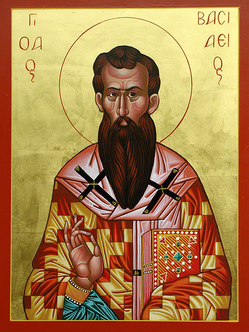 The spiritual senses are variously described as “five senses of the soul,” as “divine” or “inner faculties,” and even as “faculties of the heart” or “mind.” This doctrine inspired the theology of the Cappadocians (especially Basil the Great and Gregory of Nyssa) as much as it did the theology of the Desert Fathers (especially Evagrius of Pontus and Macarius the Great).
The spiritual senses are variously described as “five senses of the soul,” as “divine” or “inner faculties,” and even as “faculties of the heart” or “mind.” This doctrine inspired the theology of the Cappadocians (especially Basil the Great and Gregory of Nyssa) as much as it did the theology of the Desert Fathers (especially Evagrius of Pontus and Macarius the Great).
1. Hearing and Speaking the Word through Scripture
At each celebration of the Divine Liturgy of St. John Chrysostom, the presiding celebrant at the Eucharist entreats “that we may be made worthy to hear the Holy Gospel.” For “hearing, beholding and handling the Word of life” (1 Jn 1.1) are not first and foremost our entitlement or birthright as human beings; they are our privilege and gift as children of the living God. The Christian Church is, above all, a scriptural Church. Although methods of interpretation may have varied from Church Father to Church Father, from “school” to “school,” and from East to West, nevertheless, Scripture was always received as a living reality and not a dead book.
In the context of a living faith, then, Scripture is the living testimony of a lived history about the relationship of a living God with a living people. The Word, “who spoke through the prophets” (Nicene-Constantinopolitan Creed), spoke in order to be heard and take effect. It is primarily an oral and direct communication intended for human beneficiaries. The scriptural text is, therefore, derivative and secondary; the scriptural text always serves the spoken word. It is not conveyed mechanically, but communicated from generation to generation as a living word. Through the Prophet Isaiah, the Lord vows:
As rain and snow descend from heaven, watering the earth … so shall my word go from mouth to mouth, accomplishing that which I purpose. (55.10-11)
Moreover, as St. John Chrysostom explains, the divine Word demonstrates profound
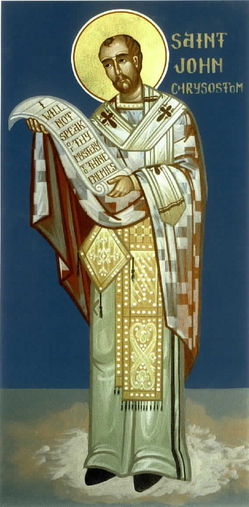 considerateness (συγκατάβασις) for the personal diversity and cultural contexts of those hearing and receiving. Adaptation of the divine Word to the specific personal readiness and the particular cultural context defines the missionary dimension of the Church, which is called to transform the world through the Word. In silence as in declaration, in prayer as in action, the divine Word addresses the whole world, “preaching to all nations” (Mt 28.19) without either privilege or prejudice to race, culture, gender and class. When we carry out that divine commission, we are assured: “Behold, I am with you always.” (Mt 28.20) We are called to speak the divine Word in all languages, “becoming all things to all people, that [we] might by all means save some.” (1 Cor. 9.22)
considerateness (συγκατάβασις) for the personal diversity and cultural contexts of those hearing and receiving. Adaptation of the divine Word to the specific personal readiness and the particular cultural context defines the missionary dimension of the Church, which is called to transform the world through the Word. In silence as in declaration, in prayer as in action, the divine Word addresses the whole world, “preaching to all nations” (Mt 28.19) without either privilege or prejudice to race, culture, gender and class. When we carry out that divine commission, we are assured: “Behold, I am with you always.” (Mt 28.20) We are called to speak the divine Word in all languages, “becoming all things to all people, that [we] might by all means save some.” (1 Cor. 9.22)
As disciples of God’s Word, then, it is today more imperative than ever that we provide a unique perspective — beyond the social, political, or economic — on the need to eradicate poverty, to provide balance in a global world, to combat fundamentalism or racism, and to develop religious tolerance in a world of conflict. In responding to the needs of the world’s poor, vulnerable and marginalized, the Church can prove a defining marker of the space and character of the global community. While the theological language of religion and spirituality differs from the technical vocabulary of economics and politics, the barriers that at first glance appear to separate religious concerns (such as sin, salvation, and spirituality) from pragmatic interests (such as commerce, trade, and politics) are not impenetrable, crumbling before the manifold challenges of social justice and globalization.
Whether dealing with environment or peace, poverty or hunger, education or healthcare, there is today a heightened sense of common concern and common responsibility, which is felt with particular acuteness by people of faith as well as by those whose outlook is expressly secular. Our engagement with such issues does not of course in any way undermine or abolish differences between various disciplines or disagreements with those who look at the world in different ways. Yet the growing signs of a common commitment for the well-being of humanity and the life of the world are encouraging. It is an encounter of individuals and institutions that bodes well for our world. And it is an involvement that highlights the supreme vocation and mission of the disciples and adherents of God’s Word to transcend political or religious differences in order to transform the entire visible world for the glory of the invisible God.
2. Seeing the Word of God — The Beauty of Icons and Nature
Nowhere is the invisible rendered more visible than in the beauty of iconography and the wonder of creation. In the words of the champion of sacred images, St. John of
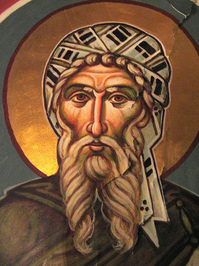 Damascus: “As maker of heaven and earth, God the Word was Himself the first to paint and portray icons.” Every stroke of an iconographer’s paintbrush – like every word of a theological definition, every musical note chanted in psalmody, and every carved stone of a tiny chapel or magnificent cathedral – articulates the divine Word in creation, which praises God in every living being and every living thing. (cf. Ps. 150.6)
Damascus: “As maker of heaven and earth, God the Word was Himself the first to paint and portray icons.” Every stroke of an iconographer’s paintbrush – like every word of a theological definition, every musical note chanted in psalmody, and every carved stone of a tiny chapel or magnificent cathedral – articulates the divine Word in creation, which praises God in every living being and every living thing. (cf. Ps. 150.6)
In affirming sacred images, the Seventh Ecumenical Council of Nicaea was not concerned with religious art; it was the continuation and confirmation of earlier definitions about the fullness of the humanity of God’s Word. Icons are a visible reminder of our heavenly vocation; they are invitations to rise beyond our trivial concerns and menial reductions of the world. They encourage us to seek the extraordinary in the very ordinary, to be filled with the same wonder that characterized the divine marvel in Genesis: “God saw everything that He made; and, indeed, it was very good.” (Gn. 1.30-31) The Greek (Septuagint) word for “goodness” is κάλλος, which implies — etymologically and symbolically — a sense of “calling.” Icons underline the Church’s fundamental mission to recognize that all people and all things are created and called to be “good” and “beautiful.”
Indeed, icons remind us of another way of seeing things, another way of experiencing realities, another way of resolving conflicts. We are asked to assume what the hymnology of Easter Sunday calls “another way of living.” For we have behaved arrogantly and dismissively toward the natural creation. We have refused to behold God’s Word in the oceans of our planet, in the trees of our continents, and in the animals of our earth. We have denied our very own nature, which calls us to stoop low enough to hear God’s Word in creation if we wish to “become participants of divine nature.” (2 Pet 1.4) How could we ignore the wider implications of the divine Word assuming flesh? Why do we fail to perceive created nature as the extended Body of Christ?
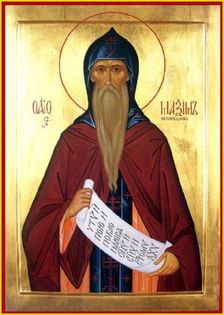 Eastern Christian theologians always emphasized the cosmic proportions of divine incarnation. The incarnate Word is intrinsic to creation, which came to be through divine utterance. St. Maximus the Confessor insists on the presence of God’s Word in all things (cf. Col. 3.11); the divine Logos stands at the center of the world, mysteriously revealing its original principle and ultimate purpose (cf. 1 Pet 1.20). This mystery is described by St. Athanasius of Alexandria:
Eastern Christian theologians always emphasized the cosmic proportions of divine incarnation. The incarnate Word is intrinsic to creation, which came to be through divine utterance. St. Maximus the Confessor insists on the presence of God’s Word in all things (cf. Col. 3.11); the divine Logos stands at the center of the world, mysteriously revealing its original principle and ultimate purpose (cf. 1 Pet 1.20). This mystery is described by St. Athanasius of Alexandria:
As the Logos [he writes], he is not contained by anything and yet contains everything; He is in everything and yet outside of everything … the first-born of the whole world in its every aspect.
The entire world is a prologue to the Gospel of John. And when the Church fails to recognize the broader, cosmic dimensions of God’s Word, narrowing its concerns to purely spiritual matters, then it neglects its mission to implore God for the transformation — always and everywhere, “in all places of His dominion” — of the whole polluted cosmos. It is no wonder that on Easter Sunday, as the Paschal celebration reaches its climax, Orthodox Christians sing:
Now everything is filled with divine light: heaven and earth, and all things beneath the earth. So let all creation rejoice.
All genuine “deep ecology” is, therefore, inextricably linked with deep theology:
“Even a stone,” writes Basil the Great, “bears the mark of God’s Word. This is true of an ant, a bee and a mosquito, the smallest of creatures. For He spread the wide heavens and laid the immense seas; and He created the tiny hollow shaft of the bee’s sting.”
Recalling our minuteness in God’s wide and wonderful creation only underlines our central role in God’s plan for the salvation of the whole world.
3. Touching and Sharing the Word of God — The Communion of Saints and the Sacraments of Life
The Word of God persistently “moves outside of Himself in ecstasy” (Dionysius the Areopagite), passionately seeking to “dwell in us” (Jn 1.14), that the world may have life in abundance. (Jn 10.10) God’s compassionate mercy is poured and shared “so as to multiply the objects of His beneficence.” (Gregory the Theologian) God assumes all that is ours, “in every respect being tested as we are, yet without sin” (Heb. 4.15), in order to offer us all that is God’s and render us gods by grace. “Though rich, He becomes poor that we might become rich,” writes the great Apostle Paul (2 Cor. 8.9), to whom this year is so aptly dedicated. This is the Word of God; gratitude and glory are due to Him.
The word of God receives His full embodiment in creation, above all in the Sacrament of
![]() the Holy Eucharist. It is there that the Word becomes flesh and allows us not simply to hear or see Him but to touch Him with our own hands, as St. John declares (I John 1,1) and make Him part of our own body and blood (σύσσωμοι καί σύναιμοι) in the words of St. John Chrysostom.
the Holy Eucharist. It is there that the Word becomes flesh and allows us not simply to hear or see Him but to touch Him with our own hands, as St. John declares (I John 1,1) and make Him part of our own body and blood (σύσσωμοι καί σύναιμοι) in the words of St. John Chrysostom.
In the Holy Eucharist the Word heard is at the same time seen and shared (κοινωνία). It is not accidental that in the early eucharistic documents, such as the book of Revelation and the Didache, the Eucharist was associated with prophesy, and the presiding bishops were regarded as successors of the prophets (e.g. Martyrion Polycarpi). The Eucharist was already by St. Paul (I Cor. 11) described us “proclamation” of Christ’s death and Second Coming. As the purpose of Scripture is essentially the proclamation of the Kingdom and the announcement of eschatological realities, the Eucharist is a foretaste of the Kindom, and in this sense the proclamation of the Word par excellence. In the Eucharist Word and Sacrament become one reality. The word ceases to be “words” and becomes a Person, embodying in Himself all human beings and all creation.
Within the life of the Church, the unfathomable self-emptying (κένωσις) and generous sharing (κοινωνία) of the divine Logos is reflected in the lives of the saints as the tangible experience and human expression of God’s Word in our community. In this way, the Word of God becomes the Body of Christ, crucified and glorified at the same time. As a result, the saint has an organic relationship with heaven and earth, with God and all of creation. In ascetic struggle, the saint reconciles the Word and the world. Through repentance and purification, the saint is filled — as Abba Isaac the Syrian insists — with compassion for all creatures, which is the ultimate humility and perfection.
This is why the saint loves with warmth and spaciousness that are both unconditional and irresistible. In the saints, we know God’s very Word, since — as St. Gregory Palamas claims — God and His saints share the same glory and splendor.” In the gentle presence of a saint, we learn how theology and action coincide. In the compassionate love of the saint, we experience God as “our father” and God’s mercy as “steadfastly enduring.” (Ps. 135, LXX) The saint is consumed with the fire of God’s love. This is why the saint imparts grace and cannot tolerate the slightest manipulation or exploitation in society or in nature. The saint simply does what is “proper and right” (Divine Liturgy of St. John Chrysostom), always dignifying humanity and honoring creation. “His words have the force of actions and his silence the power of speech” (St. Ignatius of Antioch).
And within the communion of saints, each of us is called to “become like fire” (Sayings of the Desert Fathers), to touch the world with the mystical force of God’s Word, so that — as the extended Body of Christ — the world, too, might say: “Someone touched me!” (cf. Mt 9.20) Evil is only eradicated by holiness, not by harshness. And holiness introduces into society a seed that heals and transforms. Imbued with the life of the sacraments and the purity of prayer, we are able to enter the innermost mystery of God’s Word. It is like the tectonic plates of the earth’s crust: the deepest layers need only shift a few millimeters to shatter the world’s surface. Yet for this spiritual revolution to occur, we must experience radical metanoia — a conversion of attitudes, habits and practices — for ways that we have misused or abused God’s Word, God’s gifts and God’s creation.
Such a conversion is, of course, impossible without divine grace; it is not achieved simply through greater effort or human willpower. “For mortals, it is impossible; but for God all things are possible.” (Mt 19.26) Spiritual change occurs when our bodies and souls are grafted onto the living Word of God, when our cells contain the life-giving blood-flow of the sacraments, when we are open to sharing all things with all people. As St. John Chrysostom reminds us, the sacrament of “our neighbor” cannot be isolated from the sacrament of “the altar.” Sadly, we have ignored the vocation and obligation to share. Social injustice and inequality, global poverty and war, ecological pollution and degradation result from our inability or unwillingness to share. If we claim to retain the sacrament of the altar, we cannot forgo or forget the sacrament of the neighbor — a fundamental condition for realizing God’s Word in the world within the life and mission of the Church.
Beloved Brothers in Christ,
We have explored the patristic teaching of the spiritual senses, discerning the power of
![]() hearing and speaking God’s Word in Scripture, of seeing God’s Word in icons and nature, as well as of touching and sharing God’s Word in the saints and sacraments. Yet, in order to remain true to the life and mission of the Church, we must personally be changed by this Word. The Church must resemble the mother, who is both sustained by and nourishes through the food she eats. Anything that does not feed and nourish everyone cannot sustain us either. When the world does not share the joy of Christ’s Resurrection, this is an indictment of our own integrity and commitment to the living Word of God. Prior to the celebration of each Divine Liturgy, Orthodox Christians pray that this Word will be “broken and consumed, distributed and shared” in communion. And “we know that we have passed from death to life when we love our brothers” and sisters (1 Jn 3.14).
hearing and speaking God’s Word in Scripture, of seeing God’s Word in icons and nature, as well as of touching and sharing God’s Word in the saints and sacraments. Yet, in order to remain true to the life and mission of the Church, we must personally be changed by this Word. The Church must resemble the mother, who is both sustained by and nourishes through the food she eats. Anything that does not feed and nourish everyone cannot sustain us either. When the world does not share the joy of Christ’s Resurrection, this is an indictment of our own integrity and commitment to the living Word of God. Prior to the celebration of each Divine Liturgy, Orthodox Christians pray that this Word will be “broken and consumed, distributed and shared” in communion. And “we know that we have passed from death to life when we love our brothers” and sisters (1 Jn 3.14).
The challenge before us is the discernment of God’s Word in the face of evil, the transfiguration of every last detail and speck of this world in the light of Resurrection. The victory is already present in the depths of the Church, whenever we experience the grace of reconciliation and communion. As we struggle — in ourselves and in our world — to recognize the power of the Cross, we begin to appreciate how every act of justice, every spark of beauty, every word of truth can gradually wear away the crust of evil. However, beyond our own frail efforts, we have the assurance of the Spirit, who “helps us in our weakness” (Rom. 8.26) and stands beside us as advocate and “comforter” (Jn 14-6), penetrating all things and “transforming us — as St. Symeon the New Theologian says — into everything that the Word of God says about the heavenly kingdom: pearl, grain of mustard seed, leaven, water, fire, bread, life and mystical wedding chamber.” Such is the power and grace of the Holy Spirit, whom we invoke as we conclude our address, extending to Your Holiness our gratitude and to each of you our blessings:
Heavenly King, Comforter, Spirit of Truth
Present everywhere and filling all things;
Treasury of goodness and giver of life:
Come, and abide in us.
And cleanse us from every impurity;
And save our souls.
For you are good and love humankind. Amen!
Profile of a Catholic Politician according to the Scriptures & Tradition
Gospel Commentary for 29th Sunday in Ordinary Time
Rome, 19 October 2008
Published on Zenit.org
By Father Raniero Cantalamessa, OFM Cap
This Sunday’s Gospel ends with one of those lapidary phrases of Jesus that have left a deep mark on history and on human language: “Give to Caesar what is Caesar’s, and to God what is God’s.”
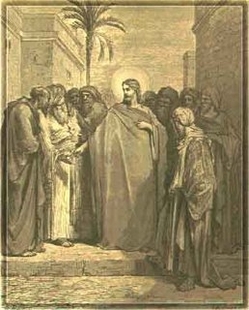 It is no longer either Caesar or God, but Caesar and God, each on his appropriate level. It is the beginning of the separation of religion and politics, which until then had been inseparable among all peoples and regimes.
It is no longer either Caesar or God, but Caesar and God, each on his appropriate level. It is the beginning of the separation of religion and politics, which until then had been inseparable among all peoples and regimes.
The Jews were used to understanding the future reign of God founded by the Messiah as a theocracy, that is, as a government directed by God ruling over the whole earth through his people. But now the words of Christ reveal a kingdom of God that is in this world but that is not of this world, that travels on a different wavelength and that, for this reason, can coexist with every other political regime, whether it be sacral or secular.
Here we see two qualitatively different sovereignties of God over the world: the spiritual sovereignty that constitutes the Kingdom of God and that is exercised directly in Christ, and the temporal and political sovereignty that God exercises indirectly, entrusting it to man’s free choice and the play of secondary causes.
Caesar and God, however, are not put on the same level, because Caesar too depends on God and must answer to him. Thus “Give to Caesar what is Caesar’s” means: “Give to Caesar what God himself wants to be given to Caesar.” God is sovereign over all, including Caesar. We are not divided between two loyalties; we are not forced to serve “two masters.”
The Christian is free to obey the state, but he is also free to resist the state when it goes against God and his law. In such a case it is not legitimate to invoke the principle about the obedience that is owed to superiors, as war criminals often do when they are on trial. Before obeying men, in fact, you must first obey God and your own conscience. You cannot give your soul, which belongs to God, to Caesar.
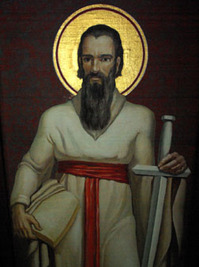 St. Paul was the first to draw practical conclusions from this teaching of Christ. He writes: “Let every person be subordinate to the higher authorities, for there is no authority except from God. … Whoever resists authority opposes the order that God has appointed. … This is why you also pay taxes, for the authorities who are in charge of this are ministers of God” (Romans 13:1 ff.).
St. Paul was the first to draw practical conclusions from this teaching of Christ. He writes: “Let every person be subordinate to the higher authorities, for there is no authority except from God. … Whoever resists authority opposes the order that God has appointed. … This is why you also pay taxes, for the authorities who are in charge of this are ministers of God” (Romans 13:1 ff.).
Paying appropriately levied taxes is for the Christian (but also for every honest person) a duty of justice and therefore an obligation of conscience. Guaranteeing order, commerce and a whole series of other services, the state gives the citizen something to which it has a right for compensation in return, precisely to be able to continue these same services.
The Catechism of the Catholic Church reminds us that tax evasion, when it reaches certain proportions, is a mortal sin equal to every other grave act of theft. It is stealing, not from the “state,” that is from no one, but from the community, that is, from everyone. Naturally, this supposes that the state is just and equitable in imposing taxes.
Christian cooperation in building a just and peaceful society does not stop at paying taxes; it must also extend itself to the promotion of common values such as the family, the defense of life, solidarity with the poor, peace. There is also another sphere in which Christians must make a contribution to politics. It does not have to do with the content of politics so much as its methods, its style.
Christians must help to remove the poison from the climate of contentiousness in politics, bring back greater respect, composure and dignity to relationships between parties. Respect for one’s neighbor, clemency, capacity for self-criticism: These are the traits that a disciple of Christ must have in all things, even in politics.
It is undignified for a Christian to give himself over to insults, sarcasm, brawling with his adversaries. If, as Jesus says, those who call their brother “stupid” are in danger of Gehenna, what then must we say about a lot of politicians?
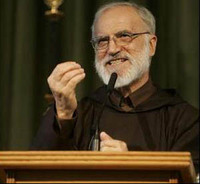 Capuchin Franciscan Father Raniero Cantalamessa is the Pontifical Household preacher. The readings for the 29th Sunday are Isaiah 45:1, 4-6; 1 Thessalonians 1:1-5b; Matthew 22:15-21.
Capuchin Franciscan Father Raniero Cantalamessa is the Pontifical Household preacher. The readings for the 29th Sunday are Isaiah 45:1, 4-6; 1 Thessalonians 1:1-5b; Matthew 22:15-21.
3 of the reports from the various working groups at the Synod on the Word of God
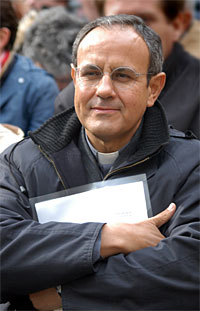 Rev. Father Julián Carrón, President of the Fraternity of Communion and Liberation
Rev. Father Julián Carrón, President of the Fraternity of Communion and Liberation
The Spanish group began by expressing the expectation of the participants relative to this Synod dedicated to the Word of God in the life of the Church. Everyone hopes that this represents an impulse on the evangelizing mission of the Church so that the Word of God reaches everybody, in the various situations that the Church must face, so that men may encounter the living Christ. We propose the following:
It is noted that among Catholics who are unfamiliar with the Old Testament and because of some embarrassment and resistance faced by passages understood with difficulty, these being the controversial questions of divine and human violence, the amorality of certain Biblical figures and a theology which is insufficient concerning the afterworld. Therefore, an adequate Biblical formation should be offered to the faithful, which would help understanding the Old Testament texts in their historical and literary context, but also and especially can facilitate Christian reading as the main hermeneutic key, since these texts acquire and show their full meaning in the New Testament.(cf. DV 16)We propose to move from a “Biblical pastoral” to a Biblical animation of all pastoral actions, that is to say, to place the Word of God as the “rock” that is the foundation, as the living source and as the inspiring breath of all of the life and of all the mission of the Church.(cf. DV 21.24) Between the diverse forms of announcing and transmitting the Word of God particular importance must be given to kerygma.
The task to announce Christ is the responsibility of each baptized person. In addition to the homily, to the actual preaching of the liturgical celebrations, it is necessary to recall the value of the preaching by all Christians in light of Baptism and of Confirmation.
Regarding the celebrations of the Word, many ecclesial communities, particularly those in the urban outskirts and in the rural areas, without Sunday Eucharistic celebrations, find the nourishment for their faith and to give a Christian witness, in the celebration of the Word of God.
In the formation of candidates to priesthood, the Word of God is essential to form the heart of a good pastor, future minister of the Word.
As pertains to the consecrated life, the academic Institutions of Sacred Scriptures, especially those in Rome and in Jerusalem, should be thanked for the great contribution they have made to the formation of exegetes and Biblicists, also the institutions of consecrated life should continue contributing to the study of the Holy Scripture, through these and other institutions, committed to spreading the knowledge of the Bible. Giving worth and careful attention in a particular way to the contemplative life is also indispensable. (cf. Benedict XVI, Angelus Address 18 November 2007). In contemplative life, the Word is welcomed, prayed and celebrated.
We feel a deep concern because of the influence of sects and new religious groups on the Catholic faithful, which sometimes bring them to even abandon the Church. This phenomenon harms our way of living the faith inside the Church and must be perceived as a call to witness it, so that the new life that Christ has brought us may shine on the face of our communities. Greater studies on the sects and the new examples of this phenomenon would be of great help, to face them suitably. In relationships with Islam and in dialogue with its representatives, its concept of the socio-political and judicial order -not always duly differentiated from religious order- should be kept in mind and its concept of marriage and the family where the role and the rights of the women are not dealt with as is foreseen in the doctrine of fundamental human rights and of the family institution and as defined by the Universal Declaration of Human Rights.
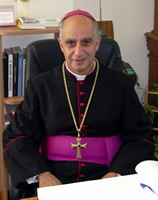 We have reflected, in a special way on the first four questions raised by the Relatio post disceptationem and arrived at formulating indications for a number of Propositiones which I will sum up as follows.
We have reflected, in a special way on the first four questions raised by the Relatio post disceptationem and arrived at formulating indications for a number of Propositiones which I will sum up as follows.
It is necessary to clarify the sense of the dialogic dimension of Revelation, since the term refers to different dimensions such as “inter-religious dialogue”, “ecumenical dialogue”, “dialogue with cultures” … When it is referring to Revelation, it takes on a meaning all of its own: this involves the primacy of the action of God who in freedom comes towards man; this implies that there can never be a parity between the two subjects.
It is vital for the expression Word of God be made unambiguous. This is not easy, but it is necessary. One of the most important considerations of the Synod shows that the Word of God cannot only be identified with the Bible. The Word of God is Christ, the Word of the Father. His preaching, like his acts, have been given to the Church which remains the primary subject that under the action of the Holy Spirit transmits Christ uninterruptedly as the announcement of salvation (DV).
The announcement of the Word of God is the first duty of the Church. An explicit announcement, always and everywhere, that is accompanied by a coherent testimony of living that renders evident the content and reinforces it. What Dei Verbum affirms for the revelation that takes place gestis verbisque intrinsice inter se connexis (DV 2), by analogy is applied to the Church that carries out its evangelizing mission with the announcement of Christ and the testimony of a coherent lifestyle.
It was felt necessary to observe that in a generalized context of secularization – that goes way beyond the Western countries –particular attention be paid, above all, to creating forms of listening so that whoever places themselves in front of the Sacred Scripture knows they are in front of God who is speaking. This demands, furthermore, a formation that allows the discovery of how the reading of the Word converts the heart, opens up to penance and sets out on a path of new life. In this context, the importance of a permanent education is underlined, above all of catechists, that allows the overcoming of the major obstacle of a lack of knowledge of the basic contents of faith, which should cause great alarm to our pastoral action.
The liturgy remains as the privileged place in which the Word of God expresses itself fully. It is necessary to overcome the gap between Bible and Liturgy, Word and Sacrament. This happens to the extent to which it reinforces the idea that the Word of God is Christ Himself in His differentiated presence in the life of His Church; above all in the real presence of the Eucharistic sacrifice; also when the sacraments are celebrated; therefore, when “the Sacred Scriptures are read in the Church, God himself speaks present in his own word” (SC 7). What has to grow, therefore, is the knowledge of a profound unity that reaches its high point in the Holy Eucharist.
The different ways in which Lectio Divina is celebrated pose the question of whether we shouldn’t clarify, above all, what is really meant by this action, so as not to leave the wealth of the tradition of the Church Fathers and Medieval teachers in the dark. The growing value that is placed on the Lectio forces us to remember that this is not the only way to meet the Word of God.
Most. Rev. Gerald Frederick Kicanas, Bishop of Tucson, Vice President of Episcopal Conference
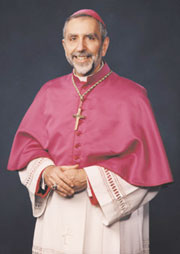 The group suggested that the tone of the exhortation should be hope filled, needs to energize the Church around the Word of God and should be pastoral and missionary.
The group suggested that the tone of the exhortation should be hope filled, needs to energize the Church around the Word of God and should be pastoral and missionary.
The group identified critical areas about which propositions should be developed. A wide range of areas surfaced. First the need to give greater recognition to lay catechists, Catholic School teachers, youth ministers, and lay biblical animators. They need to be better formed and prepared. Second, the need to understand what is attracting people to the Sects and learn from them. Third, [to work on] how preaching might be improved and made more vibrant. Fourth, the need to emphasize and highlight the contemplative dimension. Fifth, [there needs to be a way of] finding structures to bring together exegetes, liturgists, theologians, and bishops. Sixth, the need to give greater emphasis to consecrated life, pneumatology, healing and the Sacrament of Penance, and the use of media.
The dialogic nature of the Word of God needs greater emphasis. There are few opportunities in parishes to teach the necessary theology. Even more important than teaching is modeling a dialogic manner. The group discussed the need to enhance the way we read the Word. There is a need to better form people in the Word through Lectio Divina, dramatization, working with parents who are the primary educators of their children,
There was a mixed reaction to a compendium on preaching. We need to do something but group did not agree that this would be helpful. Suggestion was made for a compendium on helping people read the Word of God.
There was not a strong feeling that there needs to be a revision of the Lectionary. While some Old Testament texts are difficult, they should not be dropped. Perhaps alternatives could be available. There was concern that the question about the relation between exegetes and theologians implies a rift between them. Rather we should encourage cooperation. Scholars should have an opportunity to work in pastoral settings.
Finally the group explored relations with other Christians and with Jews. Concern was raised that Jews sometimes feel that Catholics downplay their positions for dialogue. They do not want that. Bringing the experience of the Synod to other Christian churches might foster communion
Pope Benedict’s address to the Synod of Bishops
During the Fourteenth General Congregation, Tuesday morning 14 October 2008, after
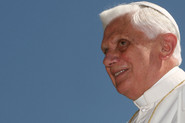 the pause, the Holy Father Benedict XVI intervened with a reflection on the Synodal theme.
the pause, the Holy Father Benedict XVI intervened with a reflection on the Synodal theme.
Dear Brothers and Sisters, the work for my book on Jesus offers ample occasion to see all the good that can come from modern exegesis, but also to recognize the problems and risks in it. Dei Verbum 12 offers two methodological indications for suitable exegetic work. In the first place, it confirms the need to use the historical-critical method, briefly describing the essential elements. This need is the consequence of the Christian principle formulated in Jn 1:14 Verbum caro factum est. The historical fact is a constitutive dimension of Christian faith. The history of salvation is not a myth, but a true story and therefore to be studied with the same methods as serious historical research.
However, this history has another dimension, that of divine action. Because of this Dei Verbum mentions a second methodological level necessary for the correct interpretation of the words, which are at the same time human words and divine Word. The Council says, following a fundamental rule for any interpretation of a literary text, that Scripture must be interpreted in the same spirit in which it was written and thereby indicates three
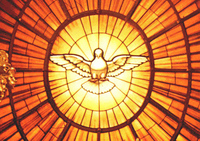 fundamental methodological elements to bear in mind the divine dimension, the pneumatology of the Bible: one must, that is 1) interpret the text bearing in mind the unity of the entire Scripture; today this is called canonical exegesis; at the time of the Council this term had not been created, but the Council says the same thing: one must bear in mind the unity of all of Scripture; 2) one must then bear in mind the living tradition of the whole Church, and finally 3) observe the analogy of faith. Only where the two methodological levels, the historical-critical and the theological one, are observed, can one speak about theological exegesis – of an exegesis suitable for this Book. While the first level today’s academic exegesis works on a very high level and truly gives us help, the same cannot be said about the other level. Often this second level, the level constituted of the three theological elements indicated by Dei Verbum seems to be almost absent. And this has rather serious consequences.
fundamental methodological elements to bear in mind the divine dimension, the pneumatology of the Bible: one must, that is 1) interpret the text bearing in mind the unity of the entire Scripture; today this is called canonical exegesis; at the time of the Council this term had not been created, but the Council says the same thing: one must bear in mind the unity of all of Scripture; 2) one must then bear in mind the living tradition of the whole Church, and finally 3) observe the analogy of faith. Only where the two methodological levels, the historical-critical and the theological one, are observed, can one speak about theological exegesis – of an exegesis suitable for this Book. While the first level today’s academic exegesis works on a very high level and truly gives us help, the same cannot be said about the other level. Often this second level, the level constituted of the three theological elements indicated by Dei Verbum seems to be almost absent. And this has rather serious consequences.
The first consequence of the absence of this second methodological level is that the Bible becomes a book only about the past. Moral consequences can be drawn from it, one can learn about history, but the Book only speaks about the past and its exegesis is no longer truly theological, becoming historiography, the history of literature. This is the first consequence: the Bible remains in the past, speaks only of the past. There is also a second even more serious consequence: where the hermeneutics of faith, indicated by Dei Verbum, disappear, another type of hermeneutics appears of necessity, a secularized, positivistic hermeneutics, whose fundamental key is the certitude that the Divine does not appear in human history. According to this hermeneutic, when there seems to be a divine element, one must explain where it came from and bring it to the human element
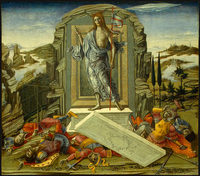 completely. Because of this, interpretations that deny the historicity of divine elements emerge. Today, the so-called mainstream of exegesis in Germany denies, for example, that the Lord instituted the Holy Eucharist and says that Jesus’ corpse stayed in the tomb. The Resurrection would not be an historical event, but a theological vision. This occurs because the hermeneutic of faith is missing: therefore a profane philosophical hermeneutic is stated, which denies the possibility of entering and of the real presence of the Divine in history. The consequence of the absence of the second methodological level is that a deep chasm was created between scientific exegesis and lectio divina. This, at times, gives rise to a form of perplexity even in the preparation of homilies. Where exegesis is not theology, Scripture cannot be the soul of theology and, vice versa, when theology is not essentially the interpretation of the Scripture in the Church, this theology has no foundation anymore.
completely. Because of this, interpretations that deny the historicity of divine elements emerge. Today, the so-called mainstream of exegesis in Germany denies, for example, that the Lord instituted the Holy Eucharist and says that Jesus’ corpse stayed in the tomb. The Resurrection would not be an historical event, but a theological vision. This occurs because the hermeneutic of faith is missing: therefore a profane philosophical hermeneutic is stated, which denies the possibility of entering and of the real presence of the Divine in history. The consequence of the absence of the second methodological level is that a deep chasm was created between scientific exegesis and lectio divina. This, at times, gives rise to a form of perplexity even in the preparation of homilies. Where exegesis is not theology, Scripture cannot be the soul of theology and, vice versa, when theology is not essentially the interpretation of the Scripture in the Church, this theology has no foundation anymore.
Therefore for the life and the mission of the Church, for the future of faith, this dualism between exegesis and theology must be overcome. Biblical theology and systematic theology are two dimensions of the one reality, what we call Theology. Due to this, I would hope that in one of the propositions the need to bear in mind the two methodological levels indicated in Dei Verbum 12 be mentioned, where the need to develop an exegesis not only on the historical level, but also on the theological level is needed. Therefore, widening the formation of future exegetes in this sense is necessary, to truly open the treasures of the Scripture to today’s world and to all of us.
North American Martyrs
In the North American context these martyrs demonstrate for me the work of grace in the
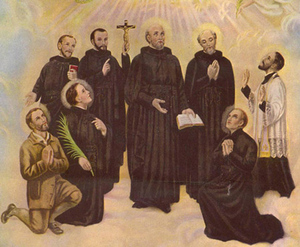 face of tremendous hardship which some would say evil. As a child when visiting my grandparents on their farm in Fonda, New York, my family would make the trip for Mass to the Shrine of the North American Martyrs in Auriesville, located in the beautiful Mohawk Valley. I learned early in my life that these martyrs, followed Jesus very closely, even to the point of identifying with Christ crucified and offering their total being to the point of death. The deaths of these men were particularly gruesome. The Gospel pericope for the feast and which focuses the mission is what Saint Matthew records: “Go therefore and make disciples of all nations, baptizing them in the name of the Father and of the Son and of the Holy Spirit, teaching them to observe all that I have commanded you; and lo, I am with you always, to the close of the age.”
face of tremendous hardship which some would say evil. As a child when visiting my grandparents on their farm in Fonda, New York, my family would make the trip for Mass to the Shrine of the North American Martyrs in Auriesville, located in the beautiful Mohawk Valley. I learned early in my life that these martyrs, followed Jesus very closely, even to the point of identifying with Christ crucified and offering their total being to the point of death. The deaths of these men were particularly gruesome. The Gospel pericope for the feast and which focuses the mission is what Saint Matthew records: “Go therefore and make disciples of all nations, baptizing them in the name of the Father and of the Son and of the Holy Spirit, teaching them to observe all that I have commanded you; and lo, I am with you always, to the close of the age.”
Brief biographies of the martyrs
Jesuit Father John Hardon’s reflection on the North American martyrs
Jesuit Father James Martin’s reflection on the martyrs
Jesuit Priests
St. Jean de Brebeuf
St. Nöel Chabanel
St. Anthony Daniel
St. Charles Garnier
St. Issac Joques
St. Gabriel Lalemant
Laymen
St. Rene Goupil
St. Jean de la Lande
Father, you consecrated the first beginnings of the faith in North America by preaching and martyrdom of Saints John & Isaac and their companions. By the help of their prayers may the Christian faith continue to grow throughout the world.
It is said that Father Jogues succeeded in burying Brother Rene Goupil calling him a martyr, because slain in hatred of God and the Church, and of their sign which is the Cross, and while exercising ardent charity towards his neighbor.
Receive guests as Christ
Let all guests who arrive be received as Christ, because He will say: “I
 was a stranger and you took Me in” (Mt 25:35). And let due honor be shown to all, especially to those “of the household of the faith” (Gal 6:10) and to wayfarers. (Rule of Saint Benedict, 53)
was a stranger and you took Me in” (Mt 25:35). And let due honor be shown to all, especially to those “of the household of the faith” (Gal 6:10) and to wayfarers. (Rule of Saint Benedict, 53)
The New York Times Travel section today has a good article promoting monastic guesthouses. The author Jane Margolies has an appreciation for the simplicity and serenity of the monastic cloister which in turn welcomes travelers. Read the article
and consider a monastery guest on your next trip.
Saint Luke
Adrienne von Speyer speaks of Saint Luke in her Book of All Saints. There, von Speyer notes Luke’s “confessional attitude toward the Lord.” In another place she calls to mind that Saint Luke serves the Lord and the early Church -indeed all of humanity–with his whole being, completely spending himself. But he performs his service in a posture of dependence: he shows us what it means to be dependent on the Lord, the One who redeems us.
Subordinate to Saint Paul’s goodness, Luke learns from Paul that the Christ is only source on which to depend. It, therefore, it can be said that as a student of Paul, Saint Luke does everything to reflect what he’s been taught.
As Luke did everything “ad majorem gloriam Pauli,” so we must be humble enough to do whatever the Lord asks in obedience.
Saint Ignatius of Antioch
It is therefore befitting that you should in every way glorify Jesus Christ, who has glorified
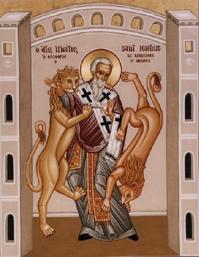 you, that by a unanimous obedience you may be perfectly joined together in the same mind, and in the same judgment, and may all speak the same thing concerning the same thing, 1 Corinthians 1:10 and that, being subject to the bishop and the presbytery, you may in all respects be sanctified.
you, that by a unanimous obedience you may be perfectly joined together in the same mind, and in the same judgment, and may all speak the same thing concerning the same thing, 1 Corinthians 1:10 and that, being subject to the bishop and the presbytery, you may in all respects be sanctified.
I do not issue orders to you, as if I were some great person. For though I am bound for the name [of Christ], I am not yet perfect in Jesus Christ. For now I begin to be a disciple, and I speak to you as fellow-disciples with me. For it was needful for me to have been stirred up by you in faith, exhortation, patience, and long-suffering. But inasmuch as love suffers me not to be silent in regard to you, I have therefore taken upon me first to exhort you that you would all run together in accordance with the will of God. For even Jesus Christ, our inseparable life, is the [manifested] will of the Father; as also bishops, settled everywhere to the utmost bounds [of the earth], are so by the will of Jesus Christ.
 Wherefore it is fitting that you should run together in accordance with the will of your bishop, which thing also you do. For your justly renowned presbytery, worthy of God, is fitted as exactly to the bishop as the strings are to the harp. Therefore in your concord and harmonious love, Jesus Christ is sung. And man by man, become a choir, that being harmonious in love, and taking up the song of God in unison, you may with one voice sing to the Father through Jesus Christ, so that He may both hear you, and perceive by your works that you are indeed the members of His Son. It is profitable, therefore, that you should live in an unblameable unity, that thus you may always enjoy communion with God.
Wherefore it is fitting that you should run together in accordance with the will of your bishop, which thing also you do. For your justly renowned presbytery, worthy of God, is fitted as exactly to the bishop as the strings are to the harp. Therefore in your concord and harmonious love, Jesus Christ is sung. And man by man, become a choir, that being harmonious in love, and taking up the song of God in unison, you may with one voice sing to the Father through Jesus Christ, so that He may both hear you, and perceive by your works that you are indeed the members of His Son. It is profitable, therefore, that you should live in an unblameable unity, that thus you may always enjoy communion with God.
Saint Ignatius of Antioch (c. 35-110)

